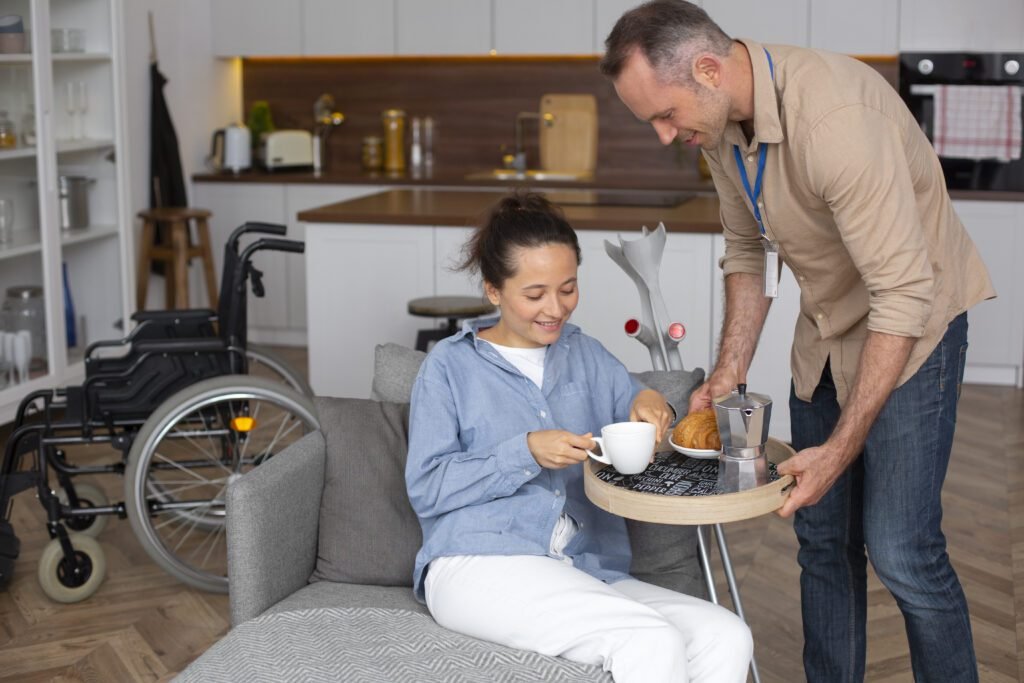Disability services in Geelong offer a range of support avenues, including versatile programs tailored to meet the specific needs of clients with disabilities. These programs include endeavours to enable and allow a person to be as independent as possible, integrate them into society, and enhance their quality of life. This blog provides crucial insights into the disability support services in Geelong, which play a central role in promoting self-dependency within the disabled community.
1. Personalised Support Coordination
Support coordination is among the vital services under the NDIS planning to help people manage the complicated world of disability services. Assistant support brokers are central to assisting participants in making decisions independently and enabling them to understand what the NDIS offers.
They address the client’s specific needs and help them formulate optimal individual programs with personal goals and potential, focusing on such facilities as personal assistance, communal inclusion, and particular types of treatments.
Such an approach helps one understand the client’s needs holistically, thus embracing their independent lives.
2. Therapeutic Services
Therapy is core for working on all aspects that pertain to disability, hence implying that therapeutic services are core to meeting the needs of people with disability. These offerings contain a wide range of people, including occupational remedies, speech and language therapy, and mental remedies.
These treatment options are necessary for the clients’ occupational, interpersonal, and emotional well-being. For example, occupational therapy can assist in fine motor skills development and help individuals achieve optimal independence in daily activities.
At the same time, speech pathology can address communication barriers, crucial for effective interaction and socialisation.
3. Community Participation Programs
Community participation programs promote social interaction and help a person become an active community member, make friends, and access leisure activities. Some of these are taking the students for group shopping, cultural shows, sports activities, and arts and crafts, which help students gain social skills and belongingness.
The occurrence of such an activity in the lives of such an individual is beneficial for developing life skills and decreasing instability of emotions, achieved by association with like-minded people.
4. Home Modifications and Assistive Technology
For example, for independent living and to avoid dangers in living conditions, disability services offer the possibility to obtain home adjustments and aid technologies. There are changes in the dwelling, which involve the construction of ramps, handrails and kitchens for the physically disabled, depending on the extent of disability.
Since individuals with disabilities require the help of other people in a systematic approach to receiving assistance to achieve independence, such technologies as voice activates systems, mobility aids, and communication aids are significant in increasing the autonomy of individuals with disabilities to attain their goals that would otherwise be difficult.
5. Employment and Education Support
Support for education and employment is critical in enabling individuals with disabilities to achieve their potential in these areas. Services include vocational training, job placement programs, and on-the-job support, essential for building career paths and enhancing economic independence.
Educational supports are tailored to facilitate learning, providing accommodations and modifications necessary to overcome barriers in academic environments.
NDIS providers in Melbourne offer a holistic technique that not only aids in skill improvement but also promotes inclusion in mainstream training and employment sectors.
6. Respite Services
Crisis support relief involves the temporary timeframe given to caregivers and the families that attend to them all the time. These services allow disabled persons to be cared for by other human beings apart from their caretakers for some time in a way that prevents primary caretakers from getting overly exhausted or burdened by occasionally giving them much-needed time off.
Two types of respite care are available: home-based, where caregivers visit the client’s home to offer their services, and centre-based services, where the client and their caregivers spend some time in special facilities, and this makes it possible to have both a formal and informal complete range care to fit each family’s need.
7. Specialised Disability Accommodation
For individuals with significant disabilities, specialised disability accommodation (SDA) provides tailored and specialised housing solutions in Melbourne. These accommodations are meticulously designed with adaptive technology and changes to cater to their residents’ desires and requirements, developing a safe, comfortable, and supportive living environment.
The staff employed in those centres are notably educated and geared up to handle various complex care needs, ensuring that every individual receives the critical support, assistance, and resources to live independent and satisfying lifestyles as feasible.
SDA empowers citizens to thrive in a setting tailor-made explicitly to their disabilities and desires, promoting autonomy, dignity, and an enhanced quality of life.
8. Early Intervention Services
Childhood intervention entails the assignment of early treatment; it involves the identification of a delayed or disabled child and the beginning of offering them treatment to elevate their development.
Other services include occupational, physical, and speech therapy, which enhances a child’s developmental progression and engagement in community activities.
That is why early intervention helps the child and gives the families the tools and knowledge to help the child.
Final Thoughts
To permit individuals with disabilities residing in Geelong to lead efficient lives, it’s critical to have both accessible public spaces and comprehensive disability support programs in the region. This two-pronged approach ensures that individuals with disabilities can actively participate in their network and get entry to the assets they need to thrive. Understanding that people with disabilities have drastically numerous and complicated desires, the disability services in Geelong provide numerous specific packages that could reply to these needs.
Such endeavours help establish inclusion and autonomy and improve the quality of life for people with disabilities and their families. By addressing the unique needs and challenges this community faces, these services and accessibility features work to empower individuals, remove barriers, and foster a more inclusive and equitable society in Geelong.

